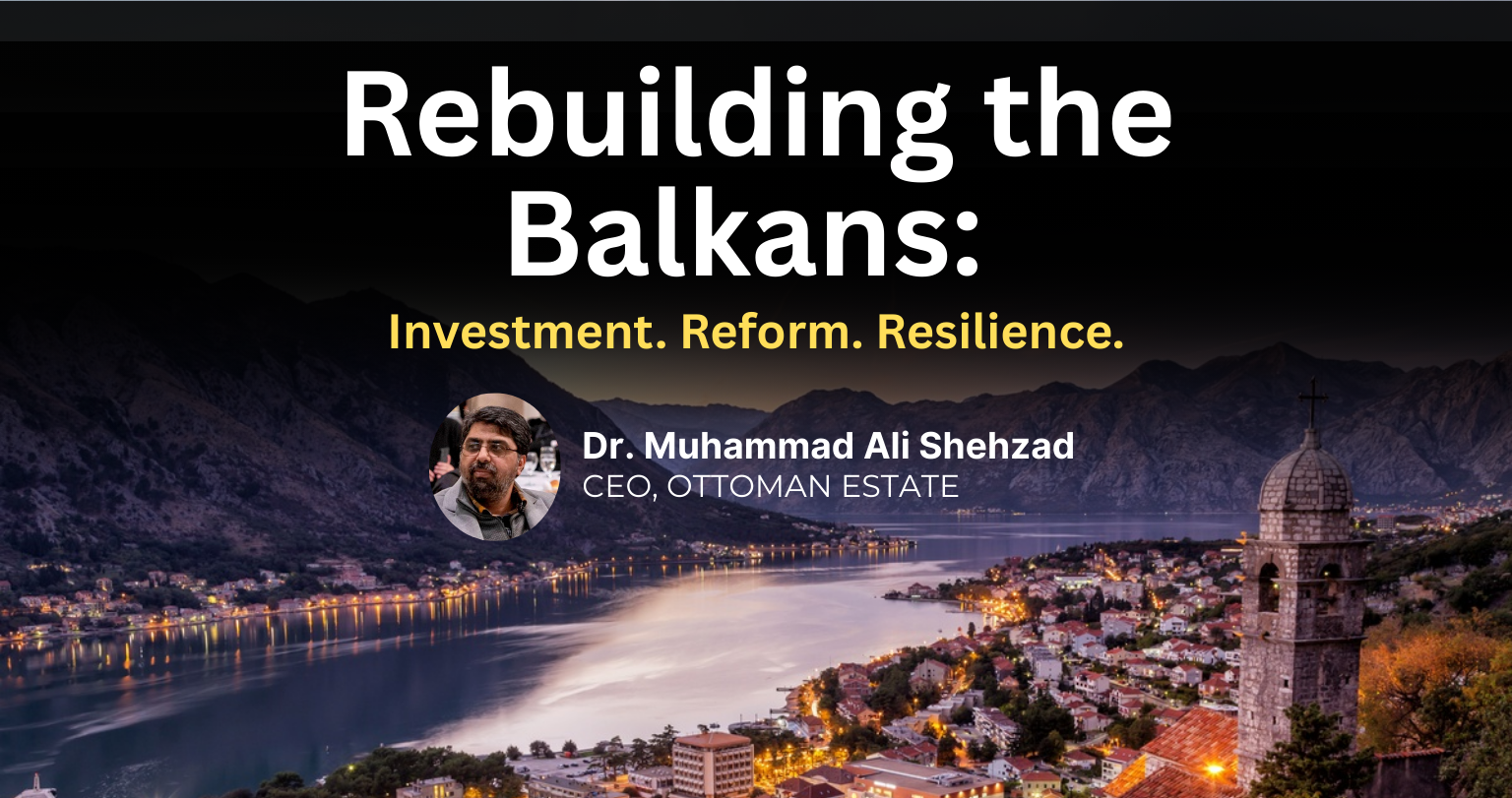By Dr. Muhammad Ali Shahzad
Introduction The Western Balkans and Southeast Europe hold immense potential for Foreign Direct Investment (FDI) due to their strategic geography, untapped markets, and skilled human capital. However, despite these strengths, the region continues to face obstacles such as governance challenges, infrastructure gaps, and lingering political instability. This article outlines a strategic roadmap for attracting sustainable FDI in the Balkans, emphasizing the role of the real estate sector and structured investment-based immigration as critical enablers of economic revitalization.
1. Key Challenges for FDI in the Balkan Region
While progress has been made in liberalizing markets and fostering regional cooperation, several persistent challenges continue to limit FDI inflows:
- Institutional Weakness: Corruption, inefficient judicial systems, and regulatory incoherence erode investor trust.
- Political and Ethnic Divides: Internal political instability and ethnic divisions introduce policy uncertainty.
- EU Accession Ambiguity: Delays in EU accession processes weaken investor expectations for legal and regulatory alignment.
- Infrastructure Gaps: Aging transportation, energy, and digital networks reduce competitiveness.
- Perception Risks: International investors often view the region through a lens of instability and low enforceability of rights.
2. Real Estate as a Driving Force for FDI
Real estate is a high-impact sector capable of absorbing capital, creating jobs, and transforming urban environments. It serves as a stable investment anchor even in uncertain economic conditions.
Policy Recommendations:
- Institutionalize Real Estate Investment Frameworks:
- Simplify land acquisition, zoning, and permitting processes.
- Digitize land registries and utilize blockchain for title verification.
- Promote real estate investment trusts (REITs) and green development incentives.
- Establish Real Estate Investment Zones (REIZs):
- Focus on coastal areas, urban renewal corridors, and logistics hubs.
- Offer tax breaks for SDG-aligned projects.
- Use REIZs to pilot governance innovations such as e-governance and fast-track legal services.
- Develop Cross-Border Urban Projects:
- Initiate joint infrastructure and property projects along regional corridors.
- Facilitate public-private partnerships (PPPs) for real estate and logistics infrastructure.
3. Investor Immigration as a Policy Lever
Investment-based migration programs offer residency or citizenship in exchange for investments, often in real estate or key business sectors.
Policy Guidelines:
- Ensure Legal Integrity: Align with FATF, OECD, and EU best practices.
- Transparency & Oversight: Establish independent verification units and transparent application criteria.
- Promote Inclusive Growth: Direct investment to underserved areas and infrastructure projects.
- Engage the Diaspora: Design investment visas for diaspora communities in the EU and U.S.
4. International Cooperation and Support Mechanisms
Collaboration with international organizations can enhance credibility and technical capacity:
- Utilize EU IPA III and EIB Green Transition Funds for co-financing.
- Partner with World Bank and IFC for regulatory and PPP support.
- Engage MIGA and OECD for political risk insurance and diagnostics.
- Form a Regional FDI Taskforce under the Regional Cooperation Council (RCC).
5. Complementary Strategic Sectors
To build a diversified FDI narrative, real estate must be linked with other growth sectors:
- Sustainable Tourism: Promote eco-tourism, heritage conservation, and resort infrastructure.
- Technology & Digital Services: Develop tech parks and remote work zones.
- Logistics and Green Energy: Align real estate with energy corridors, smart grids, and trade networks.
6. Conclusion: Building a Regional Investment Agenda
The Balkans must reshape their global narrative from that of a conflict-prone region to a frontier of strategic opportunity. By combining real estate-driven investment with structured immigration policies and governance reforms, the region can unlock substantial capital inflows. Regional coordination, supported by international partnerships, will be key to transforming this vision into reality.
Suggested Next Steps for Policymakers:
- Establish National Investment Councils to oversee reforms.
- Launch a Western Balkans Real Estate Investment Forum.
- Collaborate with World Bank or UNCTAD for investment climate assessments.
- Pilot credible investment immigration programs.
- Promote projects globally through roadshows and digital campaigns.
References
- Bertrand, J., Lemoine, J., Negrea, D., & Perrin, C. (2023). Attracting Foreign Direct Investment. Atlantic Council.
- European Commission (2023). Economic and Investment Plan for the Western Balkans.
- World Bank (2024). Western Balkans Regular Economic Report.
- UNCTAD (2024). World Investment Report.
- Regional Cooperation Council (2023). Balkan Barometer.
- Investment Migration Council Reports (2023).
- OECD (2023). Investment Policy Reviews: Southeast Europe.




